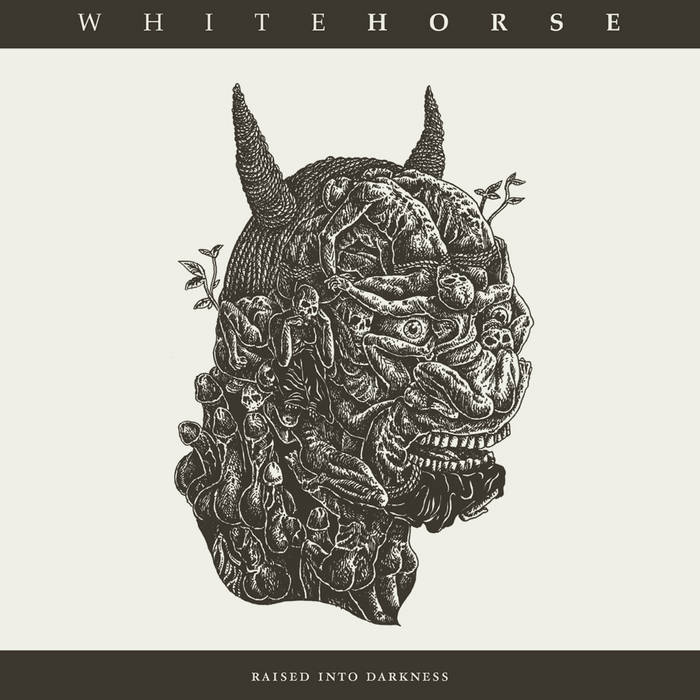Review by: Alex Hannan
Ten years into their career WHITEHORSE have remained steadfast in the production of heavy, rotted-out doom. “Raised into darkness” is their third studio LP and plunges previous listeners into a familiar atmosphere: slow, choking riffs that for long periods remain impenetrable, hard to grasp, lurching between atonal intervals. The vocal chords of one vocalist actually sound decayed, as if they’re just flapping bits of grey tissue in the pestilential wind of his breath. The other guy has a harsher creeching croak.
The title track opens with just a few minimal but foreboding strums before the whole band heaves in. They allow the opening riff to sink in to its steady rolling gait – a handful of chords grinding inexorably round each other blindly and brokenly, the odd counterstroke of the treble guitar strings shining out occasionally. The vocalist exhales gruff rumblings. Then the vocals drop out: the instrumental riff which follows subtly shifts mood, as if there is a yearning, a hint of light, a gathering of strength. In comparison to the opening it almost has an epic tone. The song continues this pattern: bleak vocal passages, wordless hope. Finally it subsides into murmuring noise, and as the band settle into a pattern of simple negativity noise elements begin to emerge, evoking the malfunction of arcane machinery. Cawing guy takes the lead in a gradual, unsettling gathering of horror.
One of WHITEHORSE’s great strengths is the subtle approach to noise and texture that appears alongside the more familiar instruments and vocal sounds, adding a sense of unease and disorientation, an uncertainty as to just where that sound is coming from and what it could be. The band sounds haunted, as if their efforts are conjuring strange spirits into resonance. Through second track “Sixteen”, long strands of keening noise arc out over the slow, harsh riffs. A cyclic, metallic chattering unwinds throughout closer “Lone descent”, across a landscape that draws stoner-doom into their network of ideas.
Certain similarities between tracks become audible as the album progresses. The riff which bookends “Sixteen” is similar to the closing idea in “Raised into darkness.” Both “Lone descent” and “Raised into darkness” are pushed over the top by scrabbling tremolo climaxes, and feature lulls of minimal, atonal riffs haloed with effects and noise. It’s as though they’ve drawn from a small pool of seeds to construct this music, but allowed each to grow its own way. The album is knotty and dense, but an individual growth.
